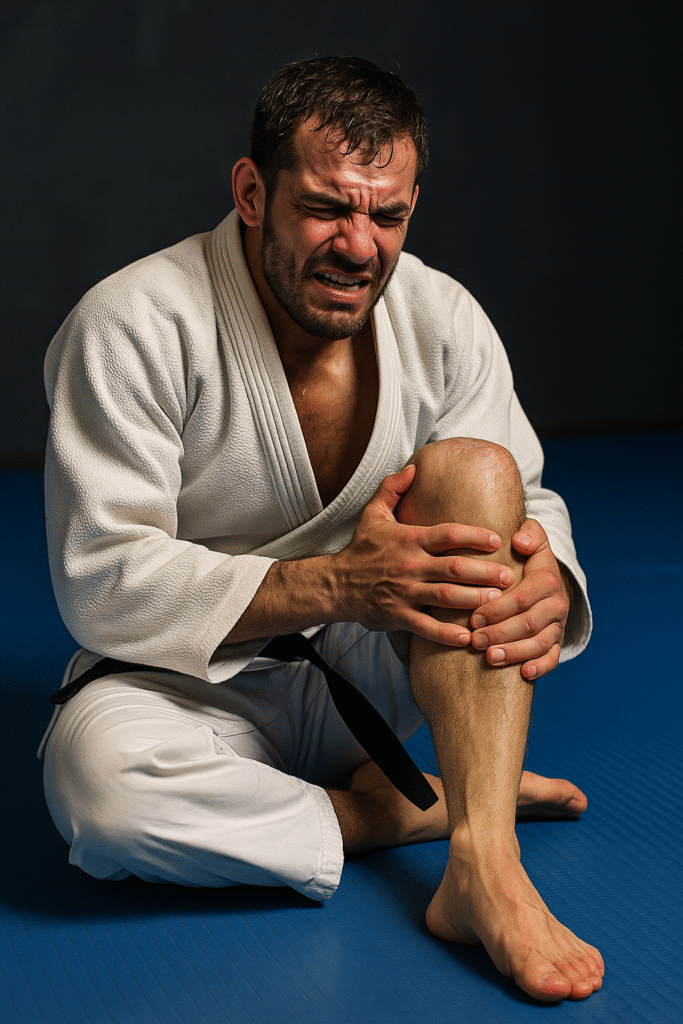Disclaimer: This blog post is for educational purposes only. It is not medical advice and should not be used as a substitute for professional medical care. The content below summarizes published research and is shared only for knowledge dissemination.

Introduction
Anterior cruciate ligament (ACL) injuries are among the most disruptive injuries in sports. For professional Judokas, whose training involves explosive throws, pivots, and grappling on the mat, an ACL tear can sideline them for months—or even end their careers.
A new study in BMJ Open Sport & Exercise Medicine explored the lived experiences of 11 professional Judokas who suffered ACL injuries and underwent reconstruction. Their stories reveal how the injury affects not only their physical performance but also their sense of identity, mental health, and time away from the sport.
The Weight of Time Lost
One of the defining aspects of ACL injury in judo is the sheer amount of time lost. Unlike minor sprains or muscle strains, ACL tears almost always require surgical reconstruction followed by long-term rehabilitation. The study notes that ACL injuries are “the most demanding in terms of sporting performance reduction and time loss from sport in judo”.
Recovery is not measured in weeks, it is measured in months, often stretching across seasons of competition. Athletes described the rehab journey as long and arduous, with many realizing only during the process how significantly their injury disrupted their careers.
In fact, the consequences are so severe that up to one in three ACL injuries among Olympic-level Judokas resulted in career termination. For context, this rate is significantly higher than in professional athletes across other sports, where roughly 83% manage to return to competition.
Recovery: A Demanding, Structured Journey
The Judokas interviewed reported that rehabilitation could take several months before even being discharged from structured care. This process demanded strict adherence, mirroring the discipline of their sport.
While most regained functional use of the knee, many admitted it never returned fully to its pre-injury state. Athletes often had to adapt their techniques, limit certain positions (such as deep squats or one-legged maneuvers), and accept long-term restrictions.
The physical demands of recovery included:
- Gradual progression from walking to running and training.
- Modified judo movements to protect the injured knee.
- Persistent swelling or discomfort even after “successful” rehab.
This time away from the mat meant not only a break in competition but also a disruption of athletic identity. Several athletes described judo as their lifestyle, meaning the absence went far beyond physical performance: it fractured their sense of self.
The Psychological Toll of Prolonged Absence
Being out of competition for months at a time weighed heavily on the Judokas. Many experienced sadness, frustration, or depression during recovery. Fear of reinjury lingered, especially as they neared a return to competition.
Isolation was another major factor. Unable to train or compete alongside teammates, Judokas reported a sense of separation from their judo community. This absence reinforced the idea that ACL recovery is not only a physical journey but also a silent psychological struggle.
Without structured mental health support, many athletes found the emotional recovery even more challenging than the physical one. This aligns with the study’s conclusion that ACL rehab for Judokas must address both body and mind.
Why ACL Injuries Steal So Much Time
The mechanism of injury helps explain why ACL tears lead to such long recovery periods. According to the athletes, most injuries occurred when their foot stuck to the mat while their body twisted during a throw or counterthrow. This violent motion not only damaged the ACL but also often resulted in additional injuries such as meniscus tears, further prolonging recovery.
Combined with the demands of surgical reconstruction and the meticulous process of regaining stability, balance, and explosiveness, it’s clear why months or even years can pass before athletes return to full competition.
Conclusion
For Judokas, an ACL injury is far more than a torn ligament…it is months of lost training, missed competitions, and a battle to reclaim both physical capability and athletic identity. Recovery requires not only surgery and rehabilitation but also psychological resilience and social support.
The study makes it clear: time lost to ACL injuries in judo is significant, often career-altering. Yet, by leaning on the discipline, respect, and perseverance central to their sport, many Judokas transformed this setback into an opportunity for personal mastery.
Disclaimer: This blog post is for educational purposes only. It is not medical advice and should not be used as a substitute for professional medical care. The content below summarizes published research and is shared only for knowledge dissemination.
Citation
Piussi R, Engström M, Prill R, et al. From the mat to mastery: a Judoka’s quest in the wake of injury – professional Judokas’ experiences of suffering an anterior cruciate ligament injury. BMJ Open Sport & Exercise Medicine. 2025;11:e002319. doi:10.1136/bmjsem-2024-002319
